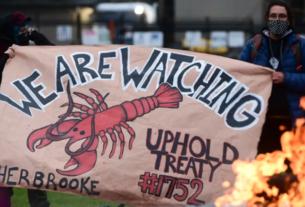 On Wednesday December 9, over 400,000 workers from the public sector (state employees, hospital workers, teachers etc) downed tools across Quebec, in the biggest general strike movement in the province’s and even in Canadian history. Most schools, hospitals, other public services and ministries were shut down, in a gigantic demonstration of force of the Quebec labour movement. Wage increases were at the centre of the workers’ demands, but the strike movement has taken an increasingly political character against the Quebec Liberal government. The Common Front of the trade unions has a mandate for six strike days, and this was the fourth, meaning that two more general strike days could take place in the coming weeks. Talk of a new general strike on the 21 December is underway.
On Wednesday December 9, over 400,000 workers from the public sector (state employees, hospital workers, teachers etc) downed tools across Quebec, in the biggest general strike movement in the province’s and even in Canadian history. Most schools, hospitals, other public services and ministries were shut down, in a gigantic demonstration of force of the Quebec labour movement. Wage increases were at the centre of the workers’ demands, but the strike movement has taken an increasingly political character against the Quebec Liberal government. The Common Front of the trade unions has a mandate for six strike days, and this was the fourth, meaning that two more general strike days could take place in the coming weeks. Talk of a new general strike on the 21 December is underway.
Below is a translation of “Front commun: Loi spéciale ou entente à rabais, la lutte doit continuer!” (originally published on December 6th) written by health workers and members of Alternative Socialiste. Alternative Socialiste is Socialist Alternative’s sister organization in Quebec and organizes in unions, universities and on the streets.
Whether the Quebec public sector strike ends with back-to-work legislation or a sellout agreement, the struggle must continue!
Martin Coiteux, President of the Treasury Council in the Liberal Couillard government, declared on November 18th “We are light-years away from an agreement [with the Common Front]”. Less than a week later, he abandoned most of his attacks on public sector workers. Workers have shown their strength with 3 days of strikes, blockades and occupations throughout Quebec. Just last week, Coiteux had to cancel two public appearances because workers were blocking all access to the venues.
This mobilization has successfully forced the government to sweep its attacks under the rug. All the proposed government measures attacking working conditions and union rights have been withdrawn.
This announcement was made shortly after the Common Front postponed the three-day, province-wide general strike scheduled for December 1st, 2nd and 3rd; and in the context of a poll results showing popular support of unions and the rejection of austerity.
Union leaders are calling this a victory, but an electrician in my union sees it differently:
“We haven’t won anything, because what the government is giving up is already in our collective agreement. Starting today the real negotiations have begun and here we cannot make any more concessions on our salaries since we’ve already made them.”
Sellout Agreement or Back-to-Work Legislation?
Two important issues remain: retirement and salaries. The government wants a zero-cost agreement, but the Common Front’s mandate is to stop the impoverishment of public sector workers. Our purchasing power has not matched cost of living increases for the past 10 years. Though the government recently demonstrated a willingness to increase our salaries, it wishes to finance them with our retirement funds.
Thus the question is: how far are the union leaders willing to compromise? There is no reason to cut pensions; the funds are fully capitalized. If the government digs in its heels, the union leadership would undoubtedly prefer to face back-to-work legislation than the wrath of their rank-and-file. After all, the rank-and-file has been asking its leadership for nearly a year how it plans to respond to back-to-work legislation, but has yet to receive an answer.
In this case, either the government risks letting things drag on, or it imposes legislation decreeing our working conditions. But in doing so, it takes a risk as several recent events have made the government unpopular.
The effects of budget cuts are increasingly being denounced by citizens’ groups. A recent poll showed that 64% of Quebecers think that the government “does a poor job managing” the negotiations and the Liberals have a 28% approval rating. The Institut de la statistique Québec (the Quebec Statistics Institute) validates the union movement with respect to the decline of workers’ buying power.
With a back-to-work legislation the government would be risking throwing gas on the fire, as it did in 2012, when popular pressure forced a provincial election and the cancelling of the legislation.
What do to in case of back-to-work legislation? Strikes, blockades, occupations!
At Alternative Socialiste’s 4th Congress in early September 2015, we voted that “unionized members of Alternative Socialiste push for strong action in case of back-to-work legislation”. A few weeks later, the Confédération des Syndicats Nationaux (Confederation of National Unions) Central Council of Metropolitan Montreal (CCMM-CSN) adopted the following resolution:
That the CCMM, in the largest possible alliance, organises an action denouncing the government with 48 hours of the government decreeing back-to-work legislation during this fall’s public sector strike.
The resolution was also adopted by the regional council of the Fédération des travailleurs et travailleuses du Québec (FTQ) (Federation of Quebec Workers), several teachers’ unions, and a student union (to which one of our members was invited to speak about the public sector negotiations). The goal is to avoid demoralising the movement in case of legislation.
The question now is how to continue the struggle. On this issue, the rank-and-file is divided. One section of CEGEP teachers are arguing for an indefinite general strike in case of back-to-work legislation. We support this courageous decision. But in doing so, the unionized left would be isolating itself from the Common Front and would be going it alone.
This attitude recalls the failure of the student movement last spring where a minority’s objective was to be as radical as possible, even at the expense of alienating its base. The student movement has not yet recovered from this setback and is not playing a significant role in the current struggle. We have to defy back-to-work legislation, but we have to do it together.
The Fédération nationale des enseignantes et des ensiegnantes du Québec (FNEEQ) (National Federation of Quebec Teachers), which organises the majority of CEGEPS teachers, has adopted the mandate stating that continue to strike despite back-to-work legislation is “a legitimate act of civil disobedience”. The FNEEQ represents 34,000 members.
The federal council of the Fédération de la santé et des services sociaux (FSSS) (Federation of health and social services), representing 130,000 health workers, has strongly rejected the idea of an indefinite general strike. Nevertheless, it has voted for ten additional strike days and has clearly stated its desire to continue the struggle. Unfortunately, there have not been any strategic discussions regarding potential back-to-work legislation.
Alternative Socialiste supports the adoption of the ten strike days, but in case of back-to-work legislation, these need to be changed into illegal strike days or at least days of national disturbance in the form of occupations and blockades aimed at the economic and political elite to thereby demonstrate that the government, whatever its strategy, will not stop us.
- For decent pay, work and retirement for all!
- For free, high quality, public services for all!
- For a public health system that is democratically run by communities and workers!
- End tax-havens!
- Tax the rich and place the banking and financial sector under public ownership!
- For a government that serves the interests of working people, not banks and corporations!



